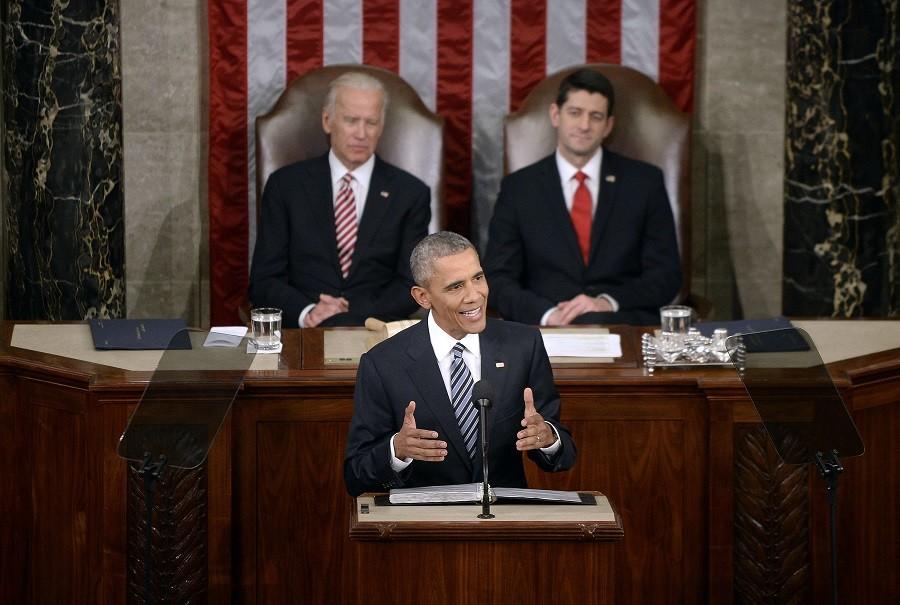In his final State of the Union address, Obama heads into his last year with a few regrets and millennial outreach
Olivier Douliery/Abaca Press/TNS
U.S. President Barack Obama delivers his final State of the Union address to a joint session of Congress at the Capitol in Washington, D.C., on Tuesday, Jan. 12, 2016.
January 13, 2016
President Obama unleashed Snapchats and hashtags in his last State of the Union address Tuesday night, showing attention to millennials and delivering an optimistic outlook on a political future without partisan conflict.
In what may have been his last major address to the American people before his successor is elected, Obama delivered a speech packed with pride in the past and optimism for the future. The president focused on big-picture issues over a laundry list of policies, vehemently defending the issues that have polarized Congress and gridlocked the capital.
But Obama, who campaigned on change and compromise, admitted to some responsibility for falling short of that goal and admitted that “rancor and suspicion between the parties has gotten worse.” He also acknowledged that many Americans fear and distrust a political system perceived as “rigged in favor of the rich or the powerful.”
Four main questions dominated the speech, including how to bolster a growing economy, harness innovation to curb climate change, protect the nation and put aside partisan politics. But the speech did not include new policy proposals or the executive actions that have come to define Obama’s presidency.
Economics Prof. Matthew Notowidigdo said that while Obama should feel proud of preventing a second “Great Recession,” the country hadn’t completely rebounded.
“A lot of Americans still feel anxious about the economy,” Notowidigdo said. “Even though unemployment’s down and labor market participation is coming back up, if you went out on street, a lot of Americans would say they don’t feel like the economy has fully recovered.”
The presidential election came up in his introduction and at times throughout the speech. At one point, Obama seemed to implicitly address leading Republican candidate Donald Trump, who has called for a “total and complete shutdown” of U.S. Muslim immigration.
“As frustration grows, there will be voices urging us to … scapegoat fellow citizens who don’t look like us, or pray like us, or vote like we do,” he said. “We can’t afford to go down that path. It won’t deliver the economy we want. It will not produce the security we want. But most of all, it contradicts everything that makes us the envy of the world.”
Americans should seek to reignite their “spirit of innovation,” not fear it, Obama said. He called for a “moonshot” to cure cancer, raising up Vice President Joe Biden — whose son, Beau, died last year from brain cancer — to head up the initiative.
Each year senators and elected officials invite guests to hear the president speak. This year, those people included the first female commandant of West Point, a Syrian refugee and anti-same-sex marriage advocate Kim Davis. First lady Michelle Obama also left a seat empty to symbolize victims lost to gun violence, a topic left largely untouched in Tuesday’s address.
Facing a generation increasingly distracted by tweets and texts, Obama sought to capture their attention through new, modern efforts leading up to the address. On Monday, the White House launched a Snapchat account, posting exclusive behind-the-scene “stories.” Throughout the day Wednesday, officials will hold a “West Wing”-themed Q&A on social media under the hashtag “BigBlockofCheeseDay.” And on Friday, Obama will sit down with popular YouTube stars.
College Democrats president Robert Bourret said the Obama presidency had been marked by strong private sector job growth and predicted an even greater need for bipartisanship in the coming years.
“Sometimes we get wrapped up in a college bubble where everyone is able to have discourse and it’s difficult to recognize that the rest of the country is stuck in gridlock,” he said. “The rhetoric has gotten so strong on both sides of the aisle that it’s hard to move forward, but democracy works through compromise.”
Members of College Republicans were unavailable for comment.
Following the address, South Carolina Gov. Nikki Haley, a Republican rumored to be on the shortlist for vice president, delivered an official rebuttal to the address with a far more negative outlook of the future but also a shared responsibility for the past.
“While Democrats in Washington bear much responsibility for the problems facing America today, they do not bear it alone,” she said. “There is more than enough blame to go around. … We as Republicans need to own that truth. We need to recognize our contributions to the erosion of the public trust in America’s leadership.”
Email: [email protected]
Twitter: @davidpkfishman












